#Exploring a Very Specific Corner of Toxic Masculinity
Explore tagged Tumblr posts
Text
“Exploring a Very Specific Corner of Toxic Masculinity”
“Exploring a Very Specific Corner of Toxic Masculinity” June 20, 2025
I was watching The Joe Budden Podcast the other day, and they got into this convo that lowkey made me think:
“Would you ride with your homeboy while R&B is playing?” “Would you take a trip to Miami with just one male friend—no girls, no wild plans, just y’all?”
Now off top, it sound regular to me. But the way some dudes reacted—like that’s a violation or something—let me know we still got some strange rules around how men are supposed to move.
It took me back to this moment a few years ago. I had hit up a homie like, “Yo, let’s go see Black Panther when it drops. Just on some cool, chill shit.” His response? “Boy, wtf?” And I’m like, “Nigga… it ain’t that deep. We can hang. It ain’t no date.”
And that’s when it hit me. There’s this weird corner of masculinity where some dudes feel like doing anything one-on-one with another man automatically needs to be disclaimed or joked about. Whether it’s a movie, a trip, or just riding around listening to some smooth R&B, it’s like they gotta protect themselves from the idea of being perceived wrong.
But really? That’s insecurity in disguise.
I’m not the type that’s overly pressed to be up under dudes all the time—but if I rock with you and we on the same wavelength, I’m down to catch a movie, hit a city, or vibe to some music in the whip. And I don’t gotta explain it or dress it up with disclaimers.
I ain’t over here craving “male bonding retreats” or none of that. But I do appreciate real, solid friendship—and I don’t need an audience or a group to validate it. Sometimes the best convos, the best ideas, the best recalibrations? Happen when it’s just two people who respect each other and move with purpose.
That don’t make it soft. That make it solid.
Truth is, some dudes can’t function without a crowd. Can’t hang one-on-one unless there’s a buffer. Can’t just be present without feeling exposed. And that’s the type of masculinity I’m not subscribing to.
So yeah—if I wanna ride with my bro while we bumpin’ some Tank or Brent Faiyaz? Cool. If we hit a trip just to catch a vibe or talk shop? Even better. Ain’t no insecurity over here.
Sometimes it really is just two grown men minding their business. That’s it. That’s the whole post.
follow me on x.com/onlyonejaevonn
visit gettothecorner.com
#THE JOE BUDDEN PODCAST#jbp#joe budden#jaevonn harris#Life Logs by Jaevonn Harris#life logs#life lessons#“Exploring a Very Specific Corner of Toxic Masculinity”#Exploring a Very Specific Corner of Toxic Masculinity
1 note
·
View note
Note
Hi Jen! I have been following you for a long time now and have never asked for advice, because once I get to typing I can’t seem to stop. But, I have been struggling with my sexuality my whole life, and now as I approach 25, I really want to be with a woman. Relationship, sexually, i do not care, I would like it all. I joined a lesbian FB group, but everyone seems to be way older than me. And gay clubs are just not my scene and usually everyone runs in packs, and I feel being drunk is not >>>
. [continued] a good reason to try and talk to someone just because I have the liquid courage (and lets be honest everyone is into each other when they’re sippin)…. I really am at a loss. I feel like a lot of young women expect me (a masculine woman) to hit on them, but I am really nervous, and when I have they might flirt super hard with me but then say they’re straight. I’m beginning to think this search for female companionship is very lonely. Why is it that gay men seem to have an abundant >[con.] sex life, but gay women.. don’t? I know this is a generalization. But still, when I go out to gay bars and it’s mainly men, they all have someone or find someone. “Lesbian night” always seems more intimidating to me, and nobody approaches me like a gay man would approach another. This dynamic is frustrating to me. Why does it seem like the lesbian community suffers a little more than the men? Why does it seem gay men have more casual sex with each other? I hope this isn’t offensive
Let me start at the bottom. Your observation about gay men is not inaccuate and certainly males have much more community support and even cultural support to “sleep around”. They are taught that sex is important and love and committment is the butt of jokes. The stuff that “pussy whipped” men do… even if they are gay, they absorb this toxicity. Also.. sadly.. gay boys as they come to realize they are thought of as sexual beings above all else in our society begin to fulfill that prophecy. They are told they are dirty, bad, disgusting so often times they internalize that and it becomes “damn if I do, damn if I don’t, so damn it I WILL”. Lesbians fall victim to the same bullshit.. being told we are dirty or wrong and we often react by dating men “giving it a try”. Or “finding a nice boy”. So it is just a difference in the way we are conditioned as male and females as to how we handle the misogyny lathered on us.
Meeting women is as a lesbian is a problem as old as humans. ( I can’t prove this but I am really really sure it is a fact). In my younger days, bars were it. That was the “gay space”. Our only real choice to be able to approach a woman and be pretty sure they also liked women. BUT as times have changed gay bars are filled with straight people. The local bar in my town has drag almost every night so it fills with bridal showers, straight couples and regulars. Those poeple help keep the doors open… I get it.. but it is no longer a space I want to be in very often.. Maybe once every two years if that. I also understand not wanted to be drunk when meeting a potiential mate or even a friend. It clouds personalities and judgements. I prefer to be with my friends for a drunken night out. They already know I am an idiot.
You of course crave sex and intimacy and the companionship of a woman. That is your natural state and very healthy to want that. Let me start by saying.. TAKE YOUR TIME> Be honest with you. IF you meet someone they don’t HAVE to be the one. You can enjoy dates, making out even sex without a lifetime committment. You need to explore a bit so you know what you like. Be aware that sex with a woman with whom you have chemistry feels very much like love.. it is probably not. Chemistry is wonderful and important but can also be a part of a Friend with Benefit arrangement or a temporary fun dating situation. Be honest with youself and with her. Talk often about emotions and what you want.
Some tips to meeting women.
1. Volunteer when lesbians do. Animal shelters, or rescues. Horse therapy barns. LGBT events. Habitat for Humanity “women built” weekends.
2. Find the nearest women’s festial and get you butt there. I know I push this a lot… but imagine 500 to 2000 women, mostly lesbians there specifically to see each other.. to be around each other.
3. Look for women authors, comedians or musicians coming to smaller venues. .Check out what is going on in your town that is not mainstream.
4. Attend charity events for any number of non profits: women’s shelters, animal rescue (including wildlife), nature centers, hiking and trail up keep, LGBT events, Food bank fundraisers etc.
WIth anyone of these. make it a plan to meet at least one person. be honest, you are seeking LGBT friends/ Community.. You might even make some straight friends. but straight people have lesbian friends, cousins and coworkers.
Approaching women: Since I came out in 1993/4 and even before that as I was in gay bars (you know.. for the music) as early as 1987 I noticed the trend of butch women being expected to approach women. YET I also observed many butch women standing in a corner trying VERY hard to look unapproachable. What a paradox of actions.
We get mixed signals. Be the strong, quiet type, don’t smile, look tough, aloof, uninterested. Puff up, walk like you own the place and ignore those attempting eye contact.. IE “make them work for it”. BUT ALSO.. butches are the “guy” right? We buy the lady a drink, we ask her to dance, we invite ourselves into her space. We boldy say things like “Dance with me”.
What the ever loving fuck? NO wonder we can’t meet each other. We have two approached fed to us but the world and neither on has any track record of working well or at all.
My advice... smile, make eye contact and say “hi”.. Basically do what it is you want to do..which is speak to an attractive woman. You being the more masculine of the two does not matter. You are human and seeking connections.. she is human and likely seeking connections. We have words and social cues for a reason.. to connect. As humans, women and lesbians we over think. Don’t. SImplify it to these two line of thoughts:
1. you say “hi” and she is not interested..she will so “no” or “no thank you” or ignore you. YOU have lost nothing. You weren’t talking to her, you still aren’t so you are just fine. Remember, it is not “you” she is rejecting. She might be married, tired, not interested, out with friends, or just a jerk.
2. you say “hi” and she says it back. You can ask to sit next to her. Tell her you think she is pretty and want to talk to her. Compliment her shirt or hair style and ask if she minds company. You can Tell her you are tired of not talking to woman and she seems nice so you stepped out of your comfort zone to speak to her (this last one with brutal honesty has a track record of success). At the end of the night, you might have a date, you might have a friend, you might have just had a nice talk with a nice woman. Either way. you either have gained something (date or friend) or LOST nothing but a little time.
Stop running “worst case scenerios” in your head. She will not toss a beer at you, laugh at you, call you ugly nor turn to her friends and make fun of you. AND If she does.. aren’t you glad she didn’t say “yes” to a date.
As far as social media look in to more specific lesbians groups. Maybe look at hiking, biking, history.. etc.. narrow it down from just “lesbians”or dating sights. Bi woman are also out there and have sites open to th
em. Find lesbians or bi women with similar interests and you might find some closer to your age. Ask the older women on the Facebook pages about other connections. Maybe there are in other groups or clubs where they see young women asking about finding each other. Us old schoolers know how to network..let them help you.
I hope some of this helps. Let me know how it is going and if you learn something i forgot, please share it with me.
23 notes
·
View notes
Text
flannel scarf and glitter hairspray
Name:Adrian
Age: 25
Sexuality: Demisexual, Lesbian
Gender: Genderfluid
Occupation: Banking – postgrad english major
Location: Campsie
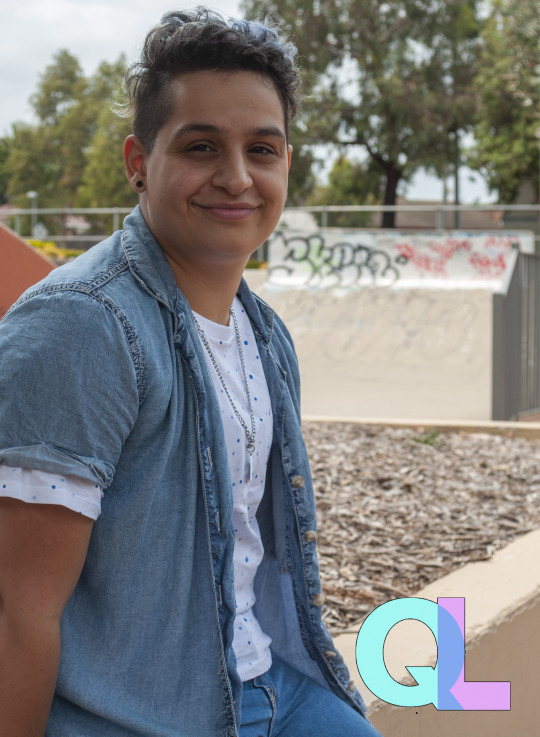
I like to present myself in an androgynous way. Most of my clothing is pretty masculine in the sense that I do prefer pants and a shirt for comfort reasons, but if it’s a hot day, I’ll wear a dress, and I don’t feel invalidated by that. I still enjoy slight touches of feminine influences in my life, and definitely don’t shy away from traditionally feminine colours or anything like that. I don’t use makeup, but mostly that’s because I don’t know how to use it, rather than not liking it. I’ll put on eyeliner and lipstick and be done. My girlfriend will suggest foundation or contouring, and I just say “nah I’m good” and don’t bother to learn. I have a glitter hairspray that I use to seal in my makeup on the few occasions I do try to use it, and it gives me a nice sparkle. Probably terrible for my skin though.
Growing up as a Muslim, I frequently get asked “When did you know?” in reference to being a lesbian, and when I came out to my friends I had a bit which I’d rehearsed to explain it. When I was around thirteen, this exchange student came to our school and I was very quickly drawn to her. She was very good at art, and a very cool person, which let me have the incredibly lesbian chat to myself of “I just want to be her best friend!” I remember writing specifically in my diary “I just want a best friend. Just friends, not gay.” we got really close, and I eventually came out to her, and told her that I liked her, and she was accepting of it, which was nice, and we both then had to manage our way around her realising that she was asexual, all while we were thirteen. Her being asexual wasn’t off-putting to me, I was just thirteen and didn’t know how to approach it. Hell, she didn’t know how to approach it, because she didn’t know the label for it.
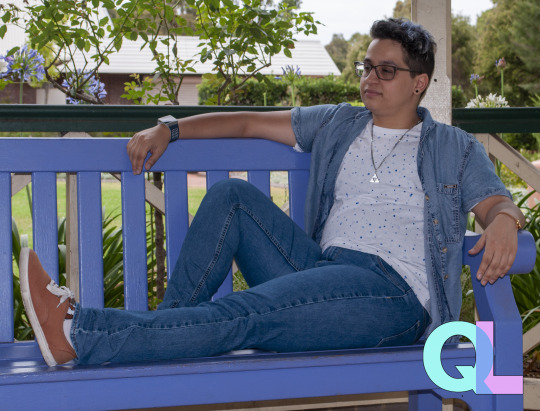
After that, I began to examine the relationships I’d had with other girls all my life. When I was very young, I remember thinking to myself “I wish I was a boy” because all of the boys in my class make my friends cry, and I think that if I were a boy, I could just make them happy, if I were a boy I’d know how to be better to them. But looking back at it I just… I was so gay, and just trying to be as straight about it as possible. I thought it would be fine if I were a boy, because then I would be allowed to like the girls and they would be happy with me. I also remember sitting in a circle in school and playing a spin the bottle truth or dare game, and always getting offended if someone didnt answer the obligatory “if anyone in our class was a boy, who would you date” question with me. If I was second choice? Offended hahaha.
I feel like there wasn’t much of a change in the way I presented myself from before realising I was gay to after, because I already accidentally dressed like a stereotypical lesbian. I guess I picked up a few extra flannels? And before it was just “I like flannel” and then became “flannel makes me gay, and gay people will know that im gay, and I wear a headscarf, so I need to let other gays know that I too am gay, so I will wear a flannel over my headscarf, and that will be my signal to all the other gays that I too am in fact gay.” and it worked great.
Realising that I was genderfluid was a much more drawn out process. When I turned eighteen I started to enjoy it when people would mistake me for a boy, I was beginning to dress very androgynously, my voice is deeper than an average cis girl, y’know. After I took off my scarf and got na undercut, people would mistake me even more. I eventually went and made a facebook account using the name Adrian, a close anagram of my dead name because I wanted to have an online space where I could be me and apart from my family. But then people who I knew in real life who’d added my new profile started calling me Adrian to my face and at first I, or my girlfriend at the time would correct them, but soon I realised that I kinda liked it, and I’d like to just go by Adrian. And that started to lead me to the point where I was examining my gender, and learning about different terms for trans and intersex people, and I thought that maybe nonbinary would be cool. I thought for a long time that I might just be a trans boy, but I also really didn’t want to go through the transition process, I’ve never wanted to go on testosterone, or have top surgery, or be wholly one of the boys. I’ve always felt comfortable in the little inbetween between boys and girls, the concept of gender as a spectrum is a very positive one for me, and I like existing somewhere on that spectrum. Genderfluid feels most comfortable for me right now, I like being able to embrace both my masculine and feminine side at will, and it suits the changing nature of my personality, and I hate the idea of sticking in the box of binary gender.
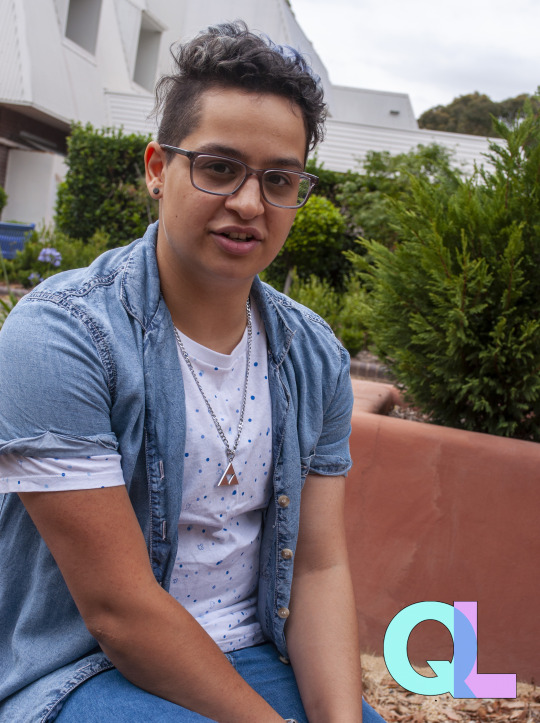
I feel like my presentation changed after realising my genderfluidity. Not so much in embracing my masculinity, but instead in embracing my femininity. I had always felt like maybe I couldnt be feminine because of how llong id spent dressig in a traditionally masculine style, but after realising that I was genderfluid, I made an effort to express that side of myself, and to not be boxed in by conventions.
I feel like stereotypes can be a bit of fun I the lesbian community, like when I was just coming out and still dressing as a very muslim woman, flannels were honestly my godsend, I felt gay even though I didnt look gay, I could just have the flannel on with my scarf and identify myself to the community. But at the same time there are a lot of stereotypes that I don’t like – there’s a lot of biphobia, based on bisexuals wanting to have fun with girls, but not settle down with girls. And that sort of negative stereotype annoys me because it’s just gatekeeping at that point, by saying that you cant really be into girls if you’re also into guys. It also invalidates the experiences of everyone who had to practice compulsory heteronormativity when they were kids, because we were always told that boys being with girls was the default, and that was what we were supposed to go for. Some people’s lesbian inner voice isnt as loud as other peoples, they would have dated men, but that doesn’t make them any less gay than anyone else. I hate the idea of gold star lesbians, just because you havent slept with a man doesnt make you better than someone who doesnt. I’ve never slept with a man, but I dont feel more valid than anyone else, if anything I feel less valid because they at least have had the experience to know that they’re definitively gay. When they’re in a bit of fun, stereotypes can be fun, but when they turn that corner into something toxic, it becomes a real problem which we need to be much more vocal about criticising and removing from society.
I feel like there are more and more mainstream shows that are coming out and showing positive representations of the LGBT experience. They do lean on stereotypical looks for their characters, but I feel like thats just visual shorthand so they dont have to do a lot of work with the characters, and can just front load a lot of their personality through their outfits.
I know for a fact that the internet is and will continue to be an incredible resource for queer people, as it gives us a chance to create a safe space to explore our identities in private. I for one wouldnt have even known that lesbianism was a thing without the internet because of my sheltered upbringing.
full gallery on facebook
follow us on instagram @thequeerlook

#genderfluid#lgbt#LGBTQIA+#gay#lesbian#demi#demisexual#photography#identity#interview#portrait#muslim#queer#pride
1 note
·
View note
Note
any thoughts on lgbt+ characters in tokyo ghoul?? the way ishida writes them can be really controversial at times (also, your metas are always mind blowing! love this blog)
There are a lot more LGBT characters than most manga of the same genre, but having characters present does not necessarily equate to good representation. Also, I’m not the best person to ask about this because while I consider myself B and part of the community, I tend to intellectualize everything so while representation is an emotional thing for most people, and they have every right for it to be!! I want to stress this!!
Anyway, personal opinion under the cut you know the drill.
I always tend to look at it as also an interaction of genre, and the thoughts the authors had in creating the characters. Rather than a question of good and bad representation, for me it’s more like a question of what attitude does this particular character in representation, consciously or unconsciously reflect.
Anyway, so I’m going to talk to this on an angle I’m informed about, pulp. Tokyo Ghoul is pulp. Not only that, but pulp, is pulp, is pulp. Before continuing these are some good links to read on how pulp, is pulp, is pulp.
Pulp and horror aren’t technically the same thing, but they overlap enough that for this discussion let’s use them interchangeably. Now for the first question, do ghouls work as a metaphor for the oppressed, especially for queer since most of the queer characters at this point are either ghouls or half ghouls? No, not really. Queer people as far as I understand don’t eat people. Except for my cannibal bisexual friend Rosi.
There is no inherent danger in queer people, or any minority, so writing a story where there is a justified reason to fear a minority never works as a 1:1 metaphor because in reality all of those reasons are completely made up. This is what we call the x men fallacy.
However, I love X Men so I’m willing to overlook the X Men Fallacy. On a second level, do I think this story works as an X Men story then? A power fantasy for the oppressed, and on that same note… No.
The story itself has always had a clear CCG bias, and even the ghouls think that human lives are inherently worth more than theirs. We have been going about 246 chapters, and still the only character to say that killing ghouls is wrong is the one who killed them the most. Ghouls and ghoul worldbuilding is pretty cool, but the focus oddly enough is almost never on them. Kaneki is our leadthrough, and in comic time and in real life time, he spends way more time on his own, or having ghouls flock around him worshipping him as a king, or in the CCG. The time that he was in Anteiku, and basically experiencing every corner of the ghoul world as a point of view protagonist is really really small in comic time. There also isn’t really that much of a ghoul world, what Ishida sees as ghoul worldbuilding and culture isn’t much to go on. The X Men, who have way way way more divergent and inconsistent powers than ghouls, have a much stronger group identity and culture than ghouls ever will. The reason we’re presented in comic as for why ghouls are sympathetic is not because they have a culture worth preserving, but rather that it’s an inherent wrong to kill a thinking, feeling, sentient being.
So Tokyo Ghoul fails on both of those levels, but at the same time that’s clearly not what it’s trying for. Tokyo Ghoul is not a power fantasy, in fact there’s a pretty significant undercurrent on how bad power fantasies actually can be if you look at Kaneki’s arc as a whole. What Tokyo Ghoul is, is a really really strict and hard hitting tragedy, that’s specifically about oppression and how oppression sucks to live under. How oppression makes people more bitter, more defensive, and makes them spiral into worse and worse situations, and how hard overcoming that cycle really is.
In that case though, it’s almost a better read from an angle of just poverty and how that leads to crime and then prison, and then a never ending cycle, especially since money and aristocracy is brought up again and again in the manga but we’re looking at it from an LGBT angle. I think from this standpoint, there’s a couple of things the manga does really well.
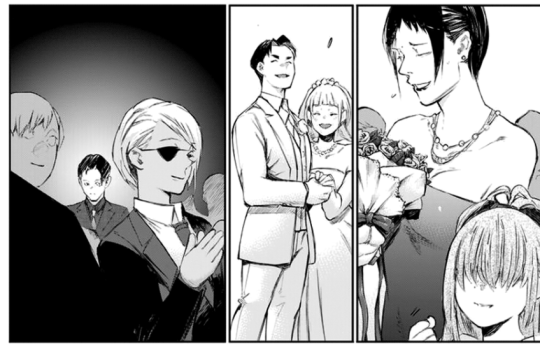
126 is primarily about the CCG getting to enjoy things among the chaos, but I’ve also read it as kind of being about privilege as well. I mean, Touka and Kaneki share so many things in common with Bujin and Yoriko but they have to literally watch the wedding from outside of the circle. Look at the line that Mutsuki drops in this chapter.
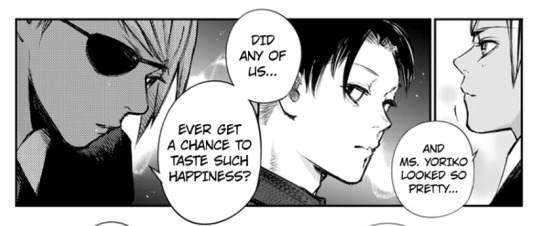
This is literally what Urie’s entire arc has been about with Bujin too. He resents Bujin for being born into a happier life and having things easier than him, and Urie is kind of right. I mean, Bujin’s family is well off, the girl he loves instantly agrees to marry him, and he literally just says that he only asked her because he wanted her to cook for him. There’s a lot of that that just screams compulsory heterosexuality. In comparison look how much more complicated Urie’s life and love life in particular is in general, especially when you consider there are a lot of queer themes kind of hovering around Urie as well. Urie’s two major confirmed love interests are a gay man, and somebody who presents masculine.
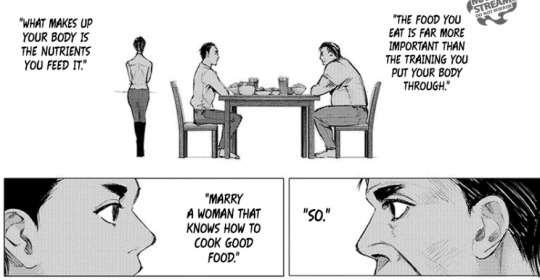
The Kuroiwas in general, and also Shinohara and the rest of the old boys club, are actually a really subtle and nuanced portrayal of privilege. They are all individually nice people, but they also have no understanding or empathy of the people below them. They’re so accustomed to their lifestyles that they don’t question it, and why should they. Bujin basically acts like he was genetically created in a lab to fit the mold of masculinity. He’s never emotive, except for when he’s angry, he never really has emotional conflicts with others, he’s good and loyal to his wife. His own flaw is really that he lacks a personality or empathy, which aren’t really things necessarily to the image of masculinity. I mean, Bujin is literally… genetically suited to be a CCG officer, he has a mutation that makes him as strong as ghouls. I mean look at Aura here, she’s being kind but also she’s kind of completely invalidating Akira’s existence, by caring more about what her dead parents think of her. Which has been Akira’s dilemna the entire manga.
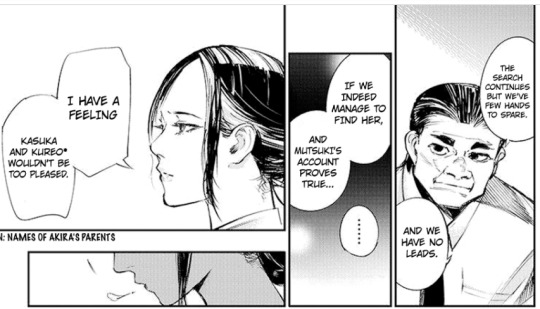
Noire, and pulp as a whole tend to be perceptive genres. They are built on masculine anxieties so as a side effect they tend to portray them well. This can be both a good and bad thing. Finally, let’s talk about Matsuri, who is very mcuh a Noir character. For one, he’s a character trying really hard to fit into a more masculine mold, he’s war hungry, he’s ruthless, he’s almost entirely emotionless. He is as cunning and ruthless as all of the other Washuu, but there is a single defect that makes it so he will never be a perfect Washuu.
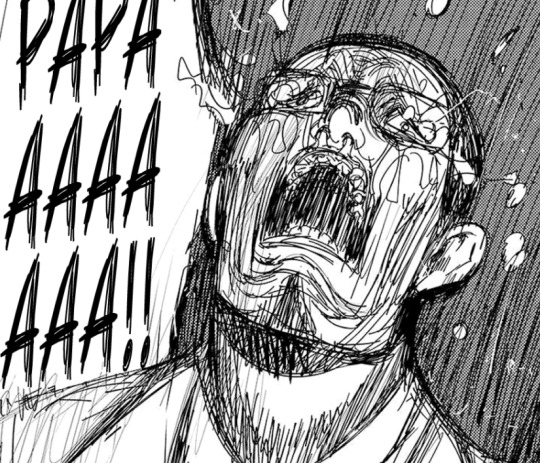
The gay aspect of Matsuri’s character is revealed to us after his father dies, and on one hand this kind of works. After all, Matsuri has always been built up as a no nonsense character, and we had no idea where the source of his beef with the rest of the Washuu seemed to come from, but there were hints here and there. People who were far more perceptive then me even picked it up ahead of time.
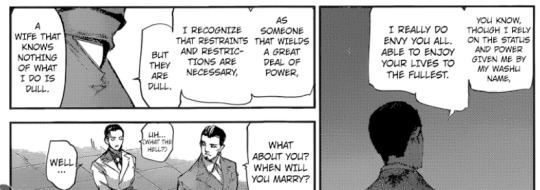
His complete disinterest in his wife which he was forced to marry, and at the same time him suddenly taking an interest in Urie’s personal relationships. The way this scene is written too, we see the performative Matsuri-
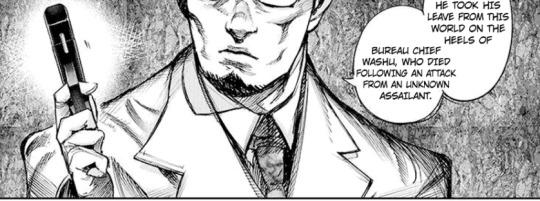
Then, his father is dead and there’s no reason to perform anymore.
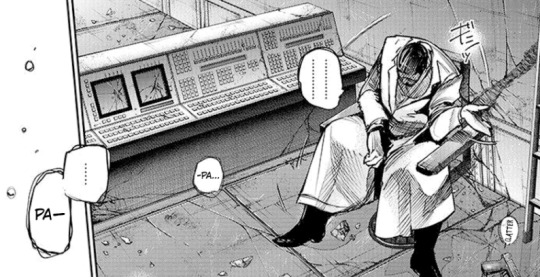
In a way Matsuri works as an extreme representation of being in the closet, because he quite literally has to breed (i’m sorry this is phrased so grossly there’s no way for me to phrase it better), because of the Washuu’s obsession with bloodline purity and descendants. He would have had to be straight, and masculine just as the rest of the Washuu are a representative of the straight, masculine toxicity. I mean, Furuta whose supposed to be the embodiment of all of that, ends up pulling a lot of lines like this:
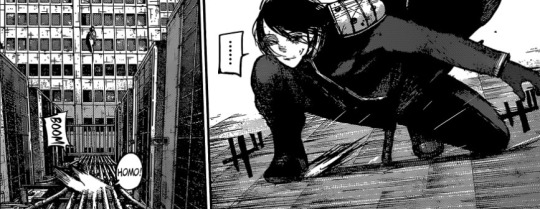
There’s a level on which Matsuri works as a character. There’s also a level on which Matsuri doesn’t work. Pulp is perceptive as I said, but in noting those masculine anxieties, it oftentimes recreates them. It’s pretty clear Urie has no interest in Matsuri.
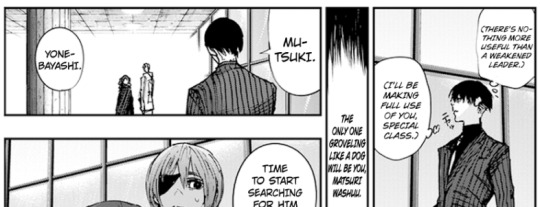
So the fact that Matsuri is just… way into him, to such over the top extents reflects a couple of undercurrents in depictions of gay men that depict them as predatory, or as somehow more inherently sexual than otherwise straight relationships. I mean… Matsuri strips naked in his office when he thinks about loving Urie for the first time, I’m not sure how that can’t be read as sexual.
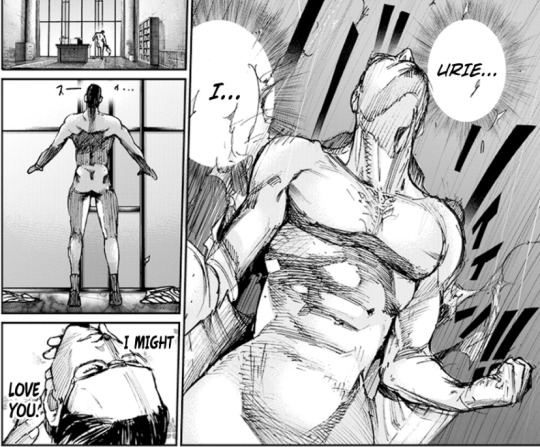
Keep in mind I’m not reading this scene as a joke, let’s take it 100% seriously. Let’s give the benefit of the doubt that Ishida is not using Matsuri as just a vehicle for gay jokes and wants to keep him as a serious character, there would still be problems with this scene.
There’s a clear difference in how this monologue about Matsuri’s love and his last stand is portrayed for an explicitly gay romance.
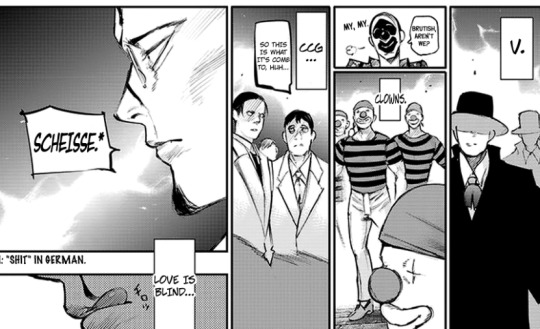
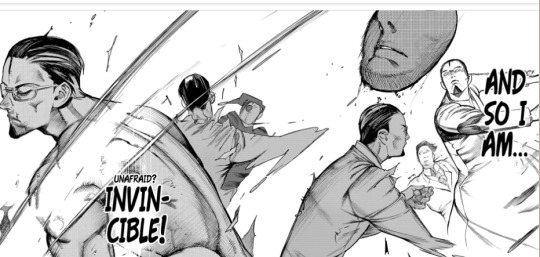
Then the same kind of monologue is portrayed for a straight one.
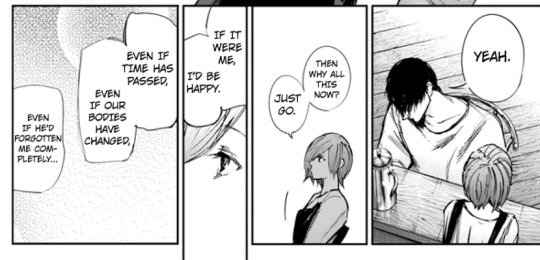
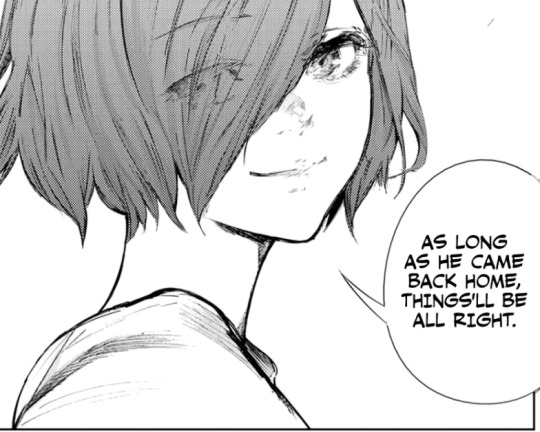
I would love if Ishida were to draw Matsuri as beautifully as he does Touka, but I doubt that’s going to happen.
It’s as a said before though, this is pulp we’re dealing with. It unconsciously recreates the same kind of stereotypes and attitudes which it wishes to explore. Which is why Pulp isn’t really the best genre to go for in terms of positive representation. Same with horror, or Noire, it all tends to fall under the banner of “Exploitation.”
There are people who can reclaim exploitation and still enjoy it anyway. I mean, I love Matsuri he’s one of my favorite characters. Then again I’m not a gay japanese man, I don’t really think I have the authority as a bisexual woman to say whether or not Matsuri is something that can be appreciated for the good and bad elements of his character.
The best I can do is lay them out for you, so there they are. I think it’s also important to note that these tropes I laid out with Matsuri are not exclusive to him, predatory or overly sexualized gay men tropes appear with Nico, and even Tsukiyama who is heavily implied to be bisexual multiple times.
83 notes
·
View notes
Text
Eye Flys Interview: Tin Foil Hats For Good

Photo by Megan Elyse Lloyd
BY JORDAN MAINZER
Eye Flys have given us a taste of what they can do. The debut release from a group made up of members of grindcore beasts Full Of Hell, Backslider, and Triac, Context is 6 songs of pummeling, blistering noise rock lasting only 13 minutes. Yet, each song brings something specific to the table both in terms of theme and style. From the socially conscious blasts of energy (“Stems”, “Weaponize”, “Fuckface”) to the nihilistic dirges ( “Dosed”, “Crushing of the Human Spirit”) to the fantastical (“The Triumph of Hagbard Celine”), Eye Flys go in many different directions, all tied together by the lyrical urgency and desperate barking of lead singer and guitarist Jake Smith.
Earlier this week, Smith answered some questions about Context, which is out next Friday via Thrill Jockey. Read below as he talks about the inspiration behind the record, making the record, and generally playing different roles in different bands.
Since I Left You: What, if anything specific, was Eye Flys trying to communicate to the general public with the formation of this group and Context?
Jake Smith: I don’t know that we had anything specific to communicate when we got started, outside of wanting to do something different and explore influences we hadn’t previously been able to in other projects. Context was more or less an attempt to musically break new ground for all of us, and lyrically, there wasn’t too much focus on how it would be received. I wrote the lyrics to these songs, and before this band, I hadn’t been tasked with that since I was a teenager playin’ in punk bands. So I think the last serious lyrics I wrote for a band were about George Bush and Dick Cheney, haha.
SILY: What does Eye Flys allow you to do artistically that you don't necessarily accomplish with Backslider?
JS: It’s so much different in a lot of ways. In Backslider, the guitarist and main songwriter is my close friend Logan [Neubauer] who is a true musical visionary. And though I place an equal amount of importance in both projects, my role in Backslider is very much about realizing the greater vision he has for it while bringing another perspective to his ideas and that works well for us. With Eye Flys, I feel like I'm on a playground, kind of, especially as we get ready to hit the studio at the end of the month to record the follow up to Context. I consider myself a guitarist first, though I've most actively been playing bass the last handful of years in most of my heavy projects. [Patrick Forrest] (our drummer, and formerly of Backslider) and I often bring riff ideas to each other and then jam them out and make big changes or write entire parts on the spot, which is really fun and exhilarating and often leads to a wave of inspiration that we can hammer out and feel good about, sometimes just in an evening. It's cool to be playing a style where you're not just learning a riff and then playing it a million times to get it down because it's difficult to play. Instead, it's like, "Here's this 3 chord riff--let's figure something to go with this other rhythm we dig to follow it up." The difference in process helps makes both bands continually interesting, and nothing blends together. I've had that problem in the past in other projects. Also, there's the lyrical aspect ,as I mentioned earlier. I don't write any lyrics in Backslider, obviously, so this gives me the opportunity to yell about things I care about or think are interesting, which is definitely artistically exciting.
SILY: "Stems" and "Weaponize" call out the egocentric and the bullshit artists--in the second person. Do you find listeners come to your projects with too many pretentious pre-conceived notions?
JS: "Stems" is mostly in response to people being so sure of things that aren't so easily understandable or without thinking critically before settling into a belief. My tendency towards agnosticism causes me to get a little worked up about that sometimes. "Weaponize", though, is certainly a call-out to bullshit artists. Some people really like to cover up their own shortcomings and damaging behavior by slinging shit at others, regardless of how much information they have or where they get it. As someone who has somewhat removed myself from the heavier social aspects of the East Coast punk world, I watch some of this stuff happen over and over again from "afar," and it can be upsetting, and that's basically what I'm addressing in that song. Of course, it also should be said that a lot of people are doing wonderful things to lift each other up and hold each other to better standards in more inclusive ways, and that stuff is super important to the survival of the greater underground music community.
To address the second part of the question, most of the music we all like and are involved in is niche. So people have really strong feeling about what these things should and shouldn't be. I can understand these feelings and share them in ways, but by the nature of this music’s natural exclusivity (through lack of "accessibility" or whatever), you're always going to encounter the pretentious folks who think your shit is "False" because it doesn't fit some definition or their version of it...that stuff is fine though. It doesn't bother me a whole lot these days. I'm kind of looking forward to some shit talk on the forthcoming EF material because we don't fit some sort of expectation or mold, haha.
SILY: The album's most energetic track, "Dosed", is followed by one of the sludgier entries, "Crushing of the Human Spirit". How did you decide upon the album's sequencing?
JS: Ya know, I think about sequencing a lot when putting together a record and also when listening to one...I'd like to think most people do. However, for this, I feel like it was easier than in most situations. I think we basically had 2 different track list ideas that had been put forth by members of the band, talked about it, and quickly agreed on one. We knew which ones were going to open and close the album before we even recorded, and it kind of seemed obvious from there. I suspect it may be a little trickier for the follow-up LP, though.
SILY: What about Illuminatus! made you want to draw inspiration from it for "The Triumph of Hagbard Celine"?
JS: I've always cited it as one of my favorite books, and Robert Anton Wilson will always mean a lot to me. He coined the term "Maybe Logic", and it will always ring true with me and the way I look at the world. The story (and all of his writing) is rich with synchronicity that seems to manifest itself out of the pages and into my life. Linear time isn't something I can subscribe to, and the way his writing fucks around with time jumping is fun for me. I always have a lot of fun with conspiracy theory stuff, and it's nice to have a writer who identifies as an Anarchist (as is one of the main characters, Hagbard Celine) and utilizes those themes in his writing...because boy howdy am I sick of these goddamn conservative pricks taking over all the tin foil hat algorithms and somehow trying to align the shit with white supremacy and incel garbage. I'm certainly not done referencing RAW's work in my lyrics. FNORD!
SILY: Was there a specific event that caused you to write the anti-toxic-masculinity anthem "Fuckface"? Or was it a feeling that had long been brewing that finally boiled over? Where in your daily life do you tend to experience toxic masculinity the most?
JS: You could say that there was an event that caused me to write it, which is not something I feel okay about putting on blast, but we'll say this man is a habitual line stepper. You could also say that it was a brewing feeling that finally boiled over. These stories aren't anything new, and I think it's important for men to be talking about this stuff. The patriarchy is so deeply embedded in our culture; men often feel owed access to women's bodies and attention for simply existing adjacent to them. This attitude and sense of entitlement is passed down over and over again through generations, and I feel like it's our job to keep these conversations moving forward and break the cycle of abuse and marginalization. This will also be a continuing theme in my lyrics, as I can't really narrow down the times and places I tend to experience these things. It's a constant in how most of society seems to carry itself.
Songs like this are good for me as well when it comes to channeling the toxic parts of my own masculinity. I have a big reactionary testosterone-y man within me that wants to go beat people up for this stuff, and it's nice to have an outlet to channel those things through without having to act like a caveman (or get my ass kicked).
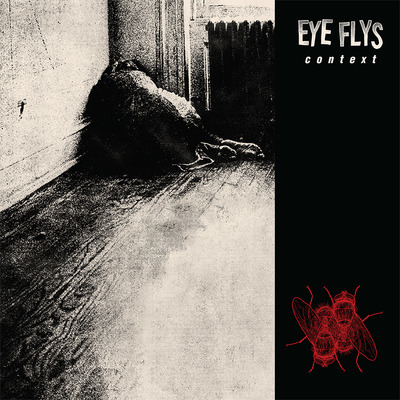
SILY: What's the inspiration behind the album title? The album art? The band name?
JS: I wanted to call the album "Context" early on in the process of making it. To me, I felt like it makes sense with some of the the lyrical themes and how they relate to perception, but also with the idea that this group of musicians is putting our efforts into a different musical context than we are used to.
The art was done by this fella Justin Stubbs. [Guitarist] Spencer [Hazard] brought him into the fold, as he's done work for Full of Hell in the past. We gave him some ideas of what we were going for aesthetically, and he really delivered. I think the art resonates with the title and some of the themes quite well. People can be so sure of things that the context of their life becomes a corner that they’re stuck in facing the goddamn wall. It sort of came together by chance, but I think it's relevant, and we're happy about it. And the band name we stole from the Melvins. The first song from their first full length Gluey Porch Treatments is called Eye Flys; we're all obviously big fans.
SILY: How have you adapted these songs to the stage?
JS: We play ‘em loud and mean and noisy!
0 notes
Photo
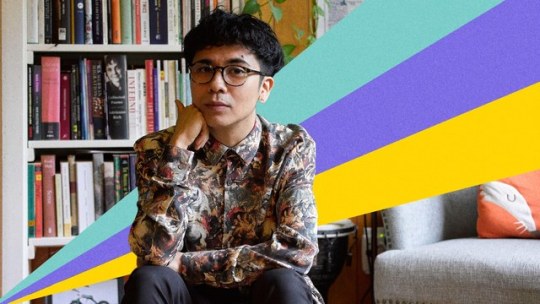
Ocean Vuong Explores the Coming-of-Age of Queerness
Published by GQ
In his debut novel, On Earth We’re Briefly Gorgeous, the author turns queer desire into the weather. He opens up about capturing the messier moments during gay sex, Crazy Rich Asians, and being ultra-basic.
By his own admission, at least on Instagram, Ocean Vuong can be summed up in four words: “very libra. ultra basic.” Three years ago, when he started teaching poetry at the University of Massachusetts at Amherst, his students often rationalized his opinions by pointing out that he was a Libra, leaving Vuong, who was more familiar with Chinese astrology, feeling “so exposed.” He did some homework on the traits of Libras. “One of the factors is there is a lot of pent-up emotions that have very few releases,” he says, laughing, a week before the release of his debut novel, On Earth We’re Briefly Gorgeous.
The ultra-basic? “That's just growing up poor,” says Vuong, 30, who was born in Ho Chi Minh City before immigrating to Hartford, Connecticut, when he was two. “That's just growing up and eating mayonnaise and Wonder Bread sandwiches. But it's ultra-basic. We can take basic to a celebratory extreme.”
On Earth We’re Briefly Gorgeous takes place against this backdrop of ultra-basicness, a Connecticut of mobile homes, bathrooms with “pea-soup walls,” and corner stores littered with food-stamp receipts. Framed as a letter from a 28-year-old son, Little Dog, to his illiterate mother, the novel doesn’t advance so much as unravel, freeing threads that examine queerness, class, race, and the inheritance of trauma. Throughout, Little Dog attempts to make sense of his identity through the fractured history of his mother, who works grueling hours at a nail salon, and his schizophrenic grandmother, a former sex worker in Vietnam. He begins a relationship with a boy named Trevor, who’s addicted to oxycodone, while working on a tobacco farm. In writing about America, Vuong has ultimately written a novel about American failure. “The one good thing about national anthems,” Little Dog writes, “is that we’re already on our feet, and therefore ready to run.”
GQ spoke to the writer, who won the T. S. Eliot Prize for his 2016 collection of poetry, Night Sky with Exit Wounds, about astrology, Pride, and writing about gay sex.
GQ: As someone who identifies as “very Libra,” why do you think astrology has become so popular within the queer community?
Ocean Vuong: You know, I love astrology because it gives you a framework to demystify and un-shame certain parts of yourself, even things you think are flaws, even things that the world might pathologize you for. Astrology deems it as part of your makeup, and then you can deal with it with a language that isn't shameful, which is why it has been so important for queer folks. Instead of saying you're emotional, you're terrible, you're deceitful, you're wrong, you say, Well, you're a Libra. [laughs] And now there's a home for it. We create these homes for ourselves.
Sex is a notoriously difficult thing to write about, and something you do quite vividly throughout this book, capturing the whiplash between desire and shame. I'm wondering if you had any guides through the process, particularly as it pertains to writing about gay sex?
There are a few guides, to be surprisingly honest, but David Wojnarowicz is the one. A lot of times it was just his diaries, particularly his tape journals [Weight of the Earth] that were just released, and the essay “Closer to the Knives.” He's the only writer that really just said it, unabashed, uninformed by the literary etiquette that we are often asked to perform. I read a queer book recently where the writer describes walking into a room, and it just said, "Love was made there." I thought, Okay, sure. Why have we been so whitewashed?
For so many queer folks, this is where we have the most agency. Sometimes we don't have a say in what we do for a job, how our families see us, but we do have a say about where we find pleasure, who goes inside us and who we go inside of. That's when we have a choice, and I wanted to stay there, in a place fraught with fear, terror, shame, but also power. So the sex scenes are repeated. They're elongated.
Desire is a force that coils and brews a storm in us, even when we're just looking at somebody. I wanted to turn desire into the weather, to stay in a moment of potency.
I found it quite radical, especially when Little Dog loses his virginity, and you address the messier moments that can occur doing anal sex. It's so familiar to gay intimacy and yet rarely acknowledged, particularly in literature. What compelled you to write about the underbelly of gay sex?
I specifically wrote that for queer folks. There are rare moments when I know who my audience is. I'm not a writer who likes to write for specific people—I don't like to be a representative of any group—but in that moment I felt like there has to be a moment of recognizability and, further, that that quote-unquote messiness or failure is not wrong. It's part of the coming-of-age of queerness. It's also a moment of mercy. A moment of bodily failure is actually a moment where the queer bodies are their most real. Where they are absolutely standing alone on their own two feet and they start to rescue each other in that moment. Not because they are marginalized or ostracized, but because they are so outside of the frame they find their own power.
Do you recall the first time you ever saw your queer Asianness reflected in a piece of art?
Alexander Chee would be in literature, which sounds absurd because he's contemporary, but that would be the first. But the most emblematic was Happy Together by Wong Kar-Wai, because they were untouched by whiteness, and that's so rare. It's so rare. Not to mention it's just a beautiful story. The energy was always violent and toxic, but they were on their own terms.
I wonder if that specificity can exist in America.
I went to see Crazy Rich Asians here—I didn't love the movie, I thought it was boring—but I walked into this theater in western Massachusetts, and it was packed full of mostly white people at 11:30 in the morning. I sat there, and the first song that came on was traditional Chinese opera. The movie didn't even begin—it was just the song and early credits—and I just sobbed. Because I never thought I would live to see anything like that.
Do you have a thing in your closet, an item that makes you feel the most queer?
I purposefully like to wear asymmetric earrings, one dangly, one stud. It's the one moment when I say I'm purposefully off-kilter. I want people to be disoriented by my face. Even just conceptually, I find joy in having one side be different. Even my eyes, one of my eyes is different than the other. It took me a long time to find joy in that.
I’m curious about your relationship to events like Pride, particularly as a Buddhist?
Well, as a Buddhist, it's almost at times contradictory to notions of pride, because pride is related to ego. Hardcore Buddhism would say there is no such thing as the self, that the body is merely a hotel room we try to care for and then we leave. And in some sense I think that's true. In another sense I think now is one of the most important moments to rethink Pride’s relationship to queerness. A lot of the Pride parades have been hijacked by late capitalism, the commodification of the queer body to sell Chase bank accounts. We've had fucking rainbow Doritos, for God's sake. Now let's talk about safety, health-care rights, laws to protect each other. To me Pride has to quickly translate to care. And if we don't have that trajectory, that bridge from one to another, I'm not that interested.
You write from the perspective of Little Dog, a successful writer: “They will want you to succeed, but never more than them. They will write their names on your leash and call you necessary, call you urgent.” Who is “they,” and what is the leash you’re referring to?
In general, "they" are people in power, the gatekeepers, and ultimately that framework surrounds whiteness. I didn't want to write a story that folks could just get lost in on vacation and move on. I wanted the mirror of a breathing queer writer of color in the world to be reflected back onto the reader. That's a moment when the writer himself really contemplates what it means to be successful, and how success is not necessarily a clear destination. It doesn't mean you've arrived. I mean, you got somewhere, but it's not necessarily—it's not freedom. You're not free of whiteness. People start to project their project and their sense of history onto you. You're still on a leash, no matter where you go.
The moment you're quoting there is actually a moment when the book collapses, and that was important to me; to write a queer narrative is to write purposeful collapse into that narrative. In a lot of the Western canon we ask for cohesion, particularly of queer bodies, and what I want to ask is how can we write cohesive stories when our lives do not get the privilege of cohesion? In order for a queer writer of color to write a cohesive story is to ultimately write a lie.
Speaking to this collapse, your book joins a lineage of queer narratives with a tragic narrative arch. Do you feel like you are in conversation with that lineage?
It was propelled and informed by that lineage, but I don't consider it a tragic story. As a writer, I knew I didn't want to write a tragedy. I wanted to write about American failure. Because when we think of the tragedy, we think of it in relation to the queer body: The queer body fails, and therefore it's tragic. But what I want to reframe, perhaps, is that American masculinity is a failure in itself in which no one thrives, including the characters in this book. People are lost to opioids, which is an American failure. It's not necessarily looking at queerness as tragedy, but that America as we know it is in a tragic trajectory. That's why it was important for me for the book to not end on death; it literally ends on the laughter of an Asian-American woman. That's the last line.
〰️〰️〰️〰️〰️〰️〰️〰️〰️〰️〰️〰️〰️〰️〰️〰️〰️〰️〰️〰️〰️〰️〰️〰️〰️〰️
Published by GQ. Photo by Doug Levy.
1 note
·
View note